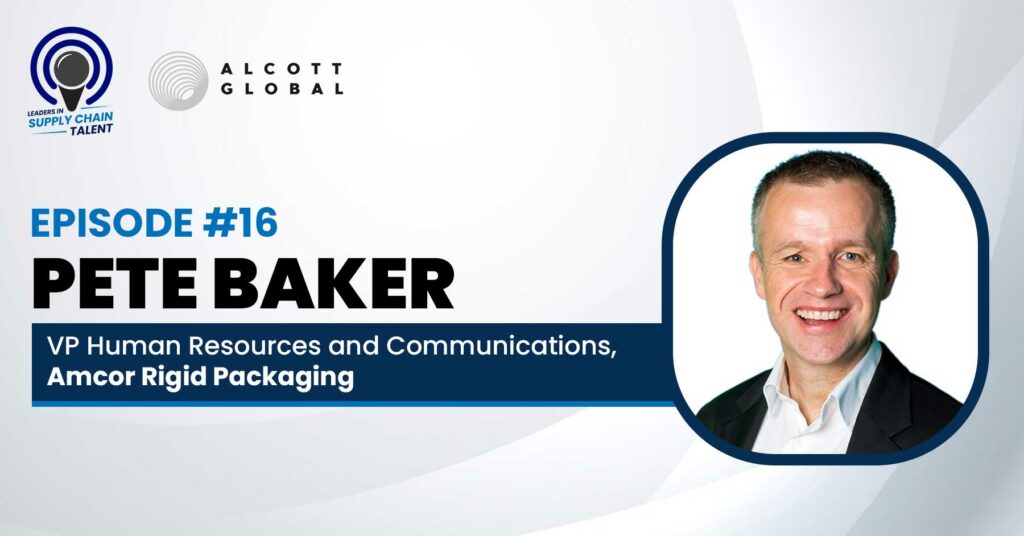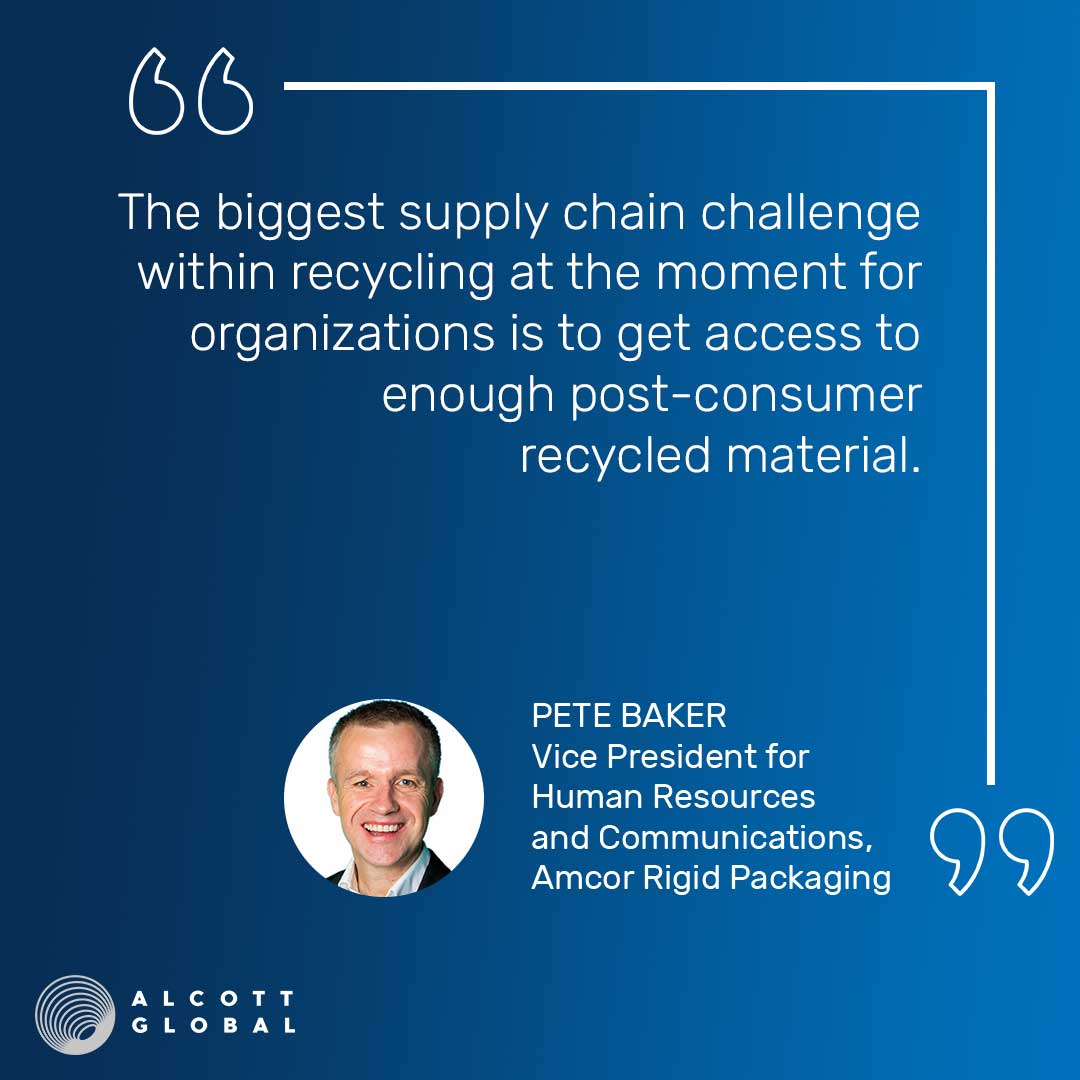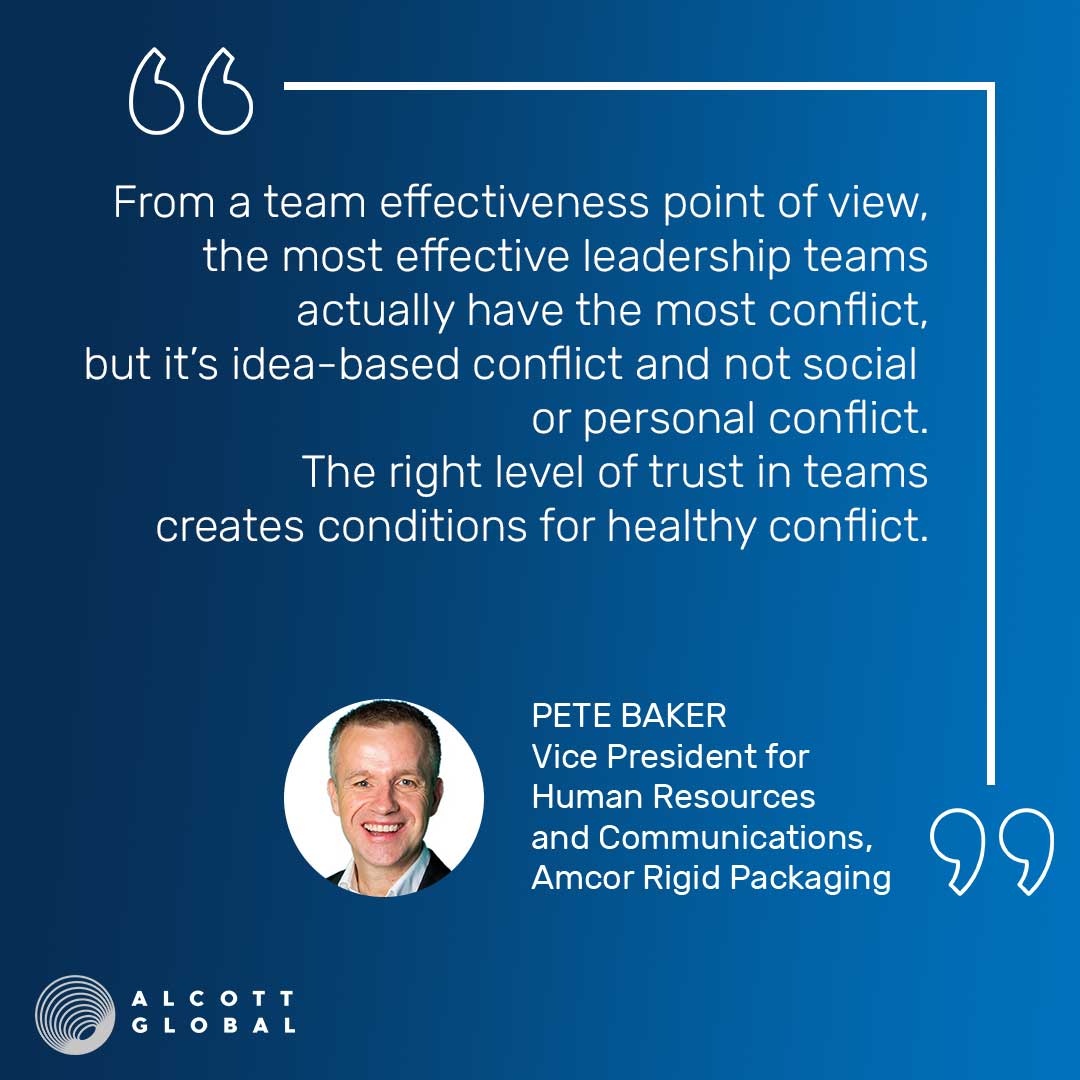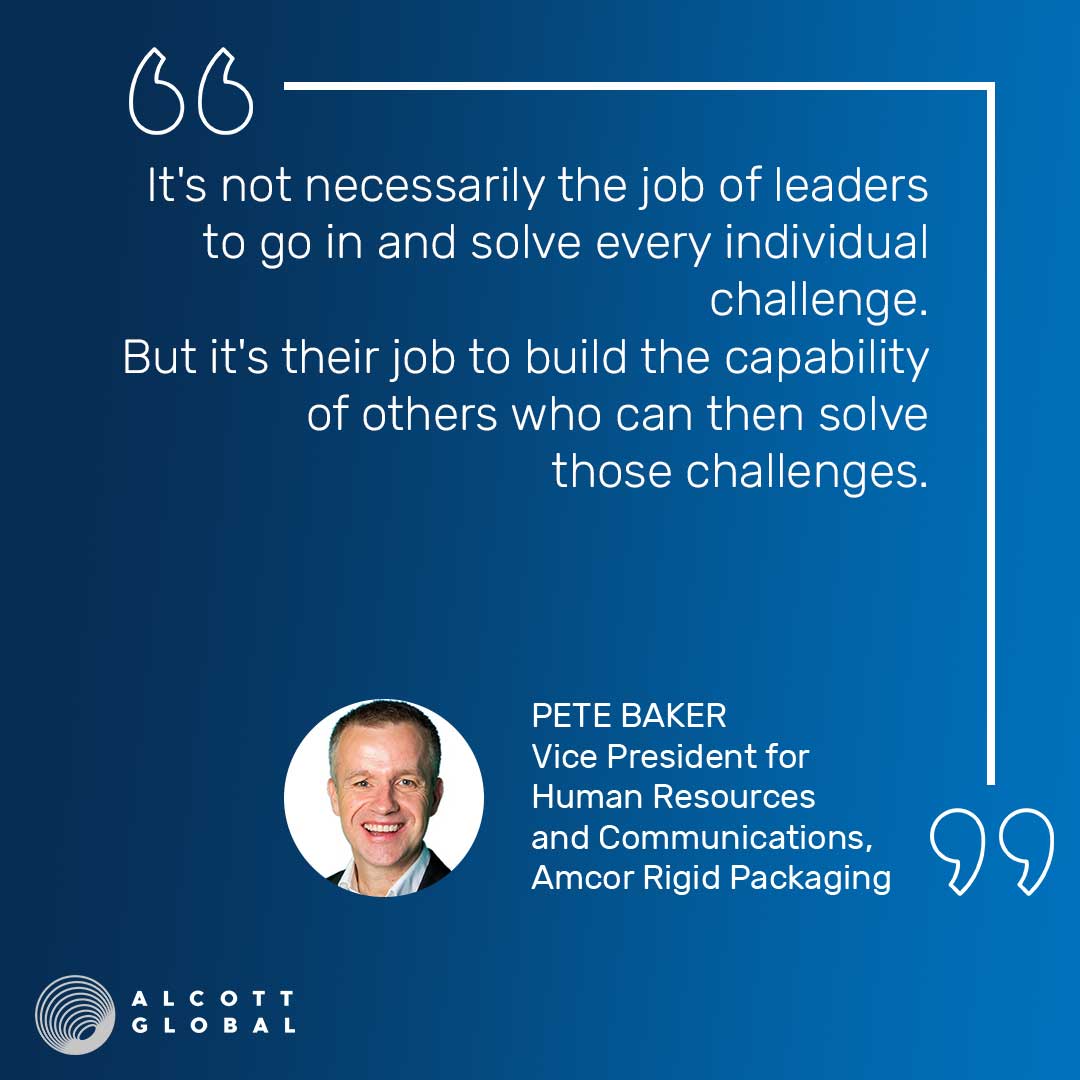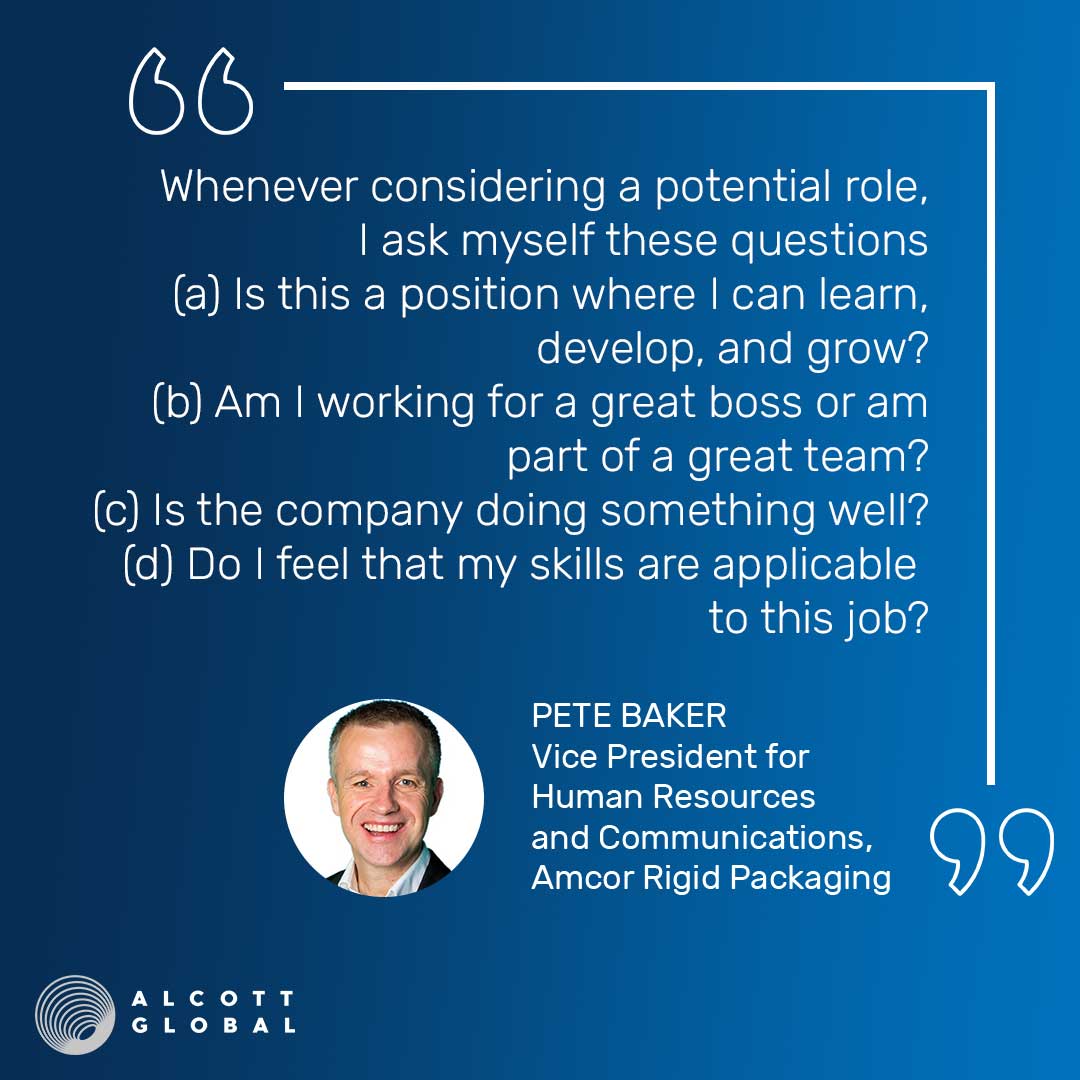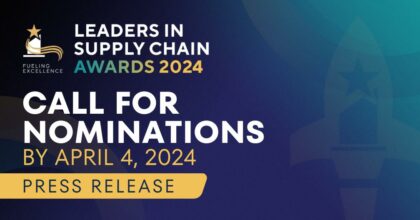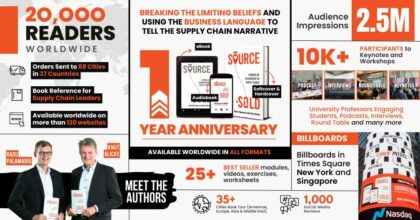Pete Baker is the Vice President for Human Resources and Communications at Amcor Rigid Packaging.
Amcor is a world leader in manufacturing packaging for food, beverage, spirits, personal care, home care, and healthcare industries with 61 facilities in 12 countries.
Pete previously held senior HR roles at First Abu Dhabi Bank, AP Moller Maersk, and Procter & Gamble. A native of Australia, Pete has lived in 9 countries throughout his career. Pete’s passion for business is driving team effectiveness and leadership transformation. Pete started his career in sales before moving into HR and worked as a standup comedian for several years.
Listen to the full discussion here:
Connect with the Guest:
Pete Baker: LinkedIn
Some of the highlights from the podcast:
- How Pete progressed from a commercial position to become a leader in the field of HR
- Amcor’s biggest challenges in developing sustainable packaging designs
- Empowering individuals and management to effectively handle certain difficulties within Amcor
- The biggest challenge that supply chains in the packaging sector will face in the next 10 years
- Advice for professionals wanting to make a career in supply chain and operations
Show notes:
- [1:14] You have had a very interesting journey from being a Commercial to an HR leader. Do share with us your story.
- [3:34] A career is a journey, not a destination, and it’s certainly been like that for me. I’ve learned, developed, and grown along the way, despite the winding road and uncertain destination.
- [4:24] What led to your decision to join Amcor, and how did you come across this opportunity?
- [7:44] “Encourage your candidates to stay connected with people they meet in organizations who have impressed them over the years.” I followed this advice myself.
- [8:56] What are some of the big initiatives that Amcor is driving? Can you give specific examples of how it’s working with its customers or some special programs that it’s doing around sustainability?
- [9:00] There are basically two primary ways we approach this issue: first, using more recycled material in the production process, and second, using less material in the whole packaging chain.
- [12:36] What are some of the biggest challenges that supply chains and customers are facing when building sustainability in their packaging design? And how is Amcor able to help them? Can you share a few examples with us?
- [13:13] The biggest supply chain challenge at the moment is getting access to enough post-consumer recycled material.
- [18:19] With so many changes that impact the organization, what are some of the people challenges you see within Amcor?
- [18:37] As an HR leader, there are a couple of different people challenges that I think about. The first of those is the employee value proposition, which involves bringing people in the door and helping them realize that companies like Amcor are driving the change if they want to be a part of sustainability.
- [22:41] What’s the kind of model in its R&D innovation that Amcor did?
- [24:07] Our R&D efforts are pretty externally networked and becoming even more so to be able to kind of leverage and take advantage of that infrastructure.
- [24:58] Can you share some examples of something that you wrote about in Amcor, which is sort of reaping its dividends now that you’ve spent six months over there?
- [25:12] I think we haven’t left too firm footprints. So we’re still at the starting stage but looking forward to continuing to make an impact.
- [28:45] What do you think are going to be the challenges for the packaging industry, specifically over the next five to eight or ten years? And how’s the organization sort of preparing for those challenges?
- [30:59] We really believe that consumers need to have their products delivered in a safe, convenient, and hygienic way. And so making sure that we’re at the forefront of consumer behavior is going to help us make sure that we’re able to produce that Pfizer type of material that consumers are looking for, and that we feel reasonably confident in our ability to do that, particularly if we can address the first two challenges of sustainability and cost.
- [31:44] You’ve spanned across three continents, from Australia, Asia, Europe, the Middle East, and now America. What’s your secret sauce? How do you navigate this change? What really works for you when you are going through this whole big change with every step that you take?
- [32:34] Whenever considering a potential role, I ask myself several questions. Firstly, is this a position where I can learn, develop, and grow? Secondly, am I working for a great boss or as part of a great team? Thirdly, is the company doing something well? And fourthly, do I feel that my skills are applicable to this job?
- [36:24] Do you have any advice or words of wisdom for individuals who are just starting out in their career or in the field of supply chain?
- [37:40] When it comes to job opportunities, avoid jumping at the first opportunity for an upgraded title or salary. Instead, ask yourself: where can you learn? Are you working for a great organization? Are you making an impact? And are your skills being utilized? By considering these factors in your career decisions, you’re likely to make the right choices over time.
Quotes from the Episode:
Soundbite from the Episode:
About the Host:
The host, Jaya Mittal is a seasoned HR professional with over 20+ years of experience. She started her journey with Unilever and progressed into senior HR roles at Nestlé and A.P Moller-Maersk. Jaya completed multiple successful programs in corporate rewards and talent acquisitions. As an HR business partner, she worked directly with the organization’s senior leadership to develop and direct an HR agenda, closely supporting strategic goals and placements of top talent.
Alcott Global connects and upgrades the supply chain ecosystem by finding the right talent through executive search, developing talent through learning solutions, and meeting supply chain technology needs through a comprehensive crunch base marketplace.
The supply chain executive search has been our focus since the very beginning, offering recruitment services for top-tier supply chain roles at every level of the end-to-end supply chain: plan, source / procure, make, and deliver. Our consultants have years of experience in placing top talent, in North America, LATAM, Europe, the Middle East & Africa, and APAC, and besides speed, one of our biggest strengths is our network within the supply chain industry, and we capitalize on it to find the best solutions.
Through the years, we have grown as an organization and our offerings with it. One of our initiatives, the learning solutions- training and supply chain academy, is focused on transforming leadership- self-leadership, executive presence, influence capital, and business acumen. Through Supplify, we aim to match corporations with the top technology companies to solve their supply chain and logistics challenges with a focus on innovation and digital transformation.
We are in constant touch with the leaders in supply chain, inviting them to inspire the supply chain professionals in thought-provoking podcast episodes and events, and showcasing what is possible at the yearly Leaders in Supply Chain Awards.
Related Episodes:
#13: Connecting the Supply Chain Dots

